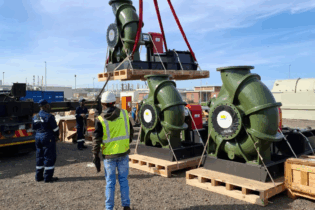A scientific team from the University of Oxford in the United Kingdom is hoping to turn the tide of disruption to fresh water supply in rural areas across Africa. The academics are looking to replace traditional water pumps at water stations with hand pumps that feature mobile phones.
The team developed, and is proposing to install, handpumps at water stations that contain a mobile phone. Whenever the pump suffers a mechanical failure or stops working for whatever reason, the mobile phone attached to the pump will send a text message to local water engineers and alert them to the situation. The device has been termed a waterpoint data transmitter and when it is attached to the handle of the waterpump, it automatically monitors the number of strokes made when operated. The data collected is sent to a central hub, where it is monitored for critical under- or over-usage, and also provides estimates of daily and seasonal demand. “We came up with the project in response to the widespread failure of hand pumps (largely because of wear and tear, and mechanical faults) and associated health and economic failure impacts on the 276-million Africans who do not have improved water services,” lead researcher Rob Hope, a senior research fellow at the University of Oxford, told SciDev.Net. Hope continued to say that many pumps in Africa are not working. “It is estimated that at any one time, one third of handpumps in rural Africa are not working. Unimproved water access is associated with 1.5 million unnecessary deaths of children under five.”“Women and children spend close to 40 billion hours collecting water each year in Africa, and 448 million school days [are] lost because of unreliable water supplies,” he added.
Julius Kabubi, a risk reduction adviser at the East African Commission, said the initiative will benefit areas which need a constant water supply. “A minor [pump] breakdown in a remote area can cause a well to be abandoned, and this is what the technology is trying to address.” The researchers will put the idea to the test in 70 villages across Kenya in August and hope to expand the technology to other African countries, including Malawi, South Sudan and Zambia. Source: itnewsafrica





